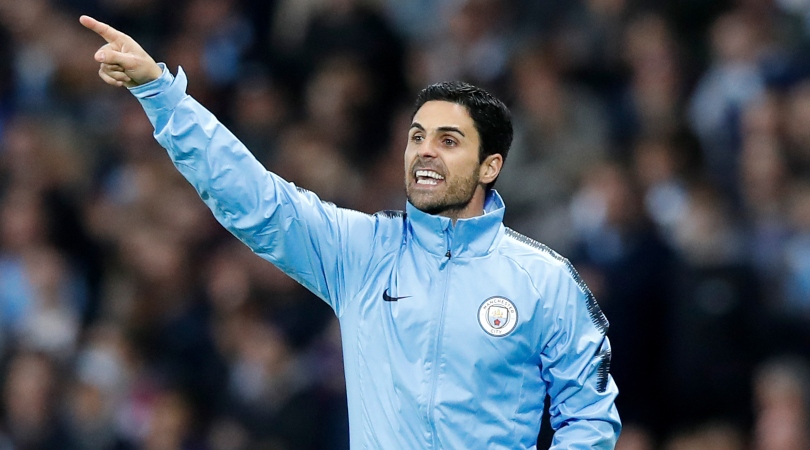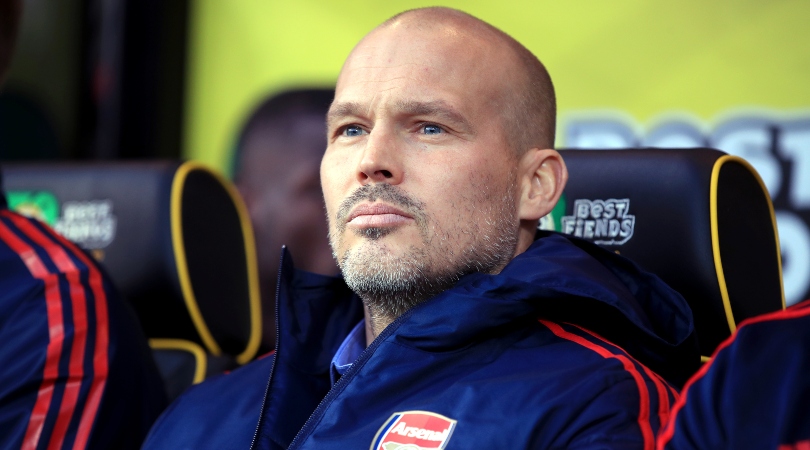Even now, appointing Mikel Arteta as manager would be a major risk for Arsenal
The Manchester City coach has none of the flaws of Unai Emery or Carlo Ancelotti. But just because his downsides aren't known doesn't mean they don't exist

Mike Arteta is the popular choice to succeed Unai Emery at Arsenal. At the time of writing, pictures have emerged of him meeting with the club’s executives, Manchester City are urging him to clarify his future and the bookmakers have installed him as a prohibitive favourite.
The job certainly seems to be his if he wants it.
The reasons behind that clamour are vague, though, and seem representative of a strange modern trend which values theories and ideas above CVs and resumés. Arteta is the classic example. What is he as a head coach? How, with any certainty, can anybody describe his attributes?
Arteta is under the patronage of Pep Guardiola and has been since 2016. While that obviously means he’s inextricable from Manchester City’s success and the footballing brand that has been built over those three years, it’s impossible to separate his influence completely.
Instead, his virtues tend to be anecdotal. They’re revealed inadvertently in articles describing training methods and interpersonal relationships with players. Essentially, the kind of testimony which is nice to hear, but which isn’t the basis for much of a pitch at interview.
The example which is always cited in this situation is Guardiola’s own rise at Barcelona, when he spent the 2007/08 season coaching Barcelona B, before being promoted to take charge of the first team. It’s not irrelevant, but it’s also not the counter-argument it appears to be.
Guardiola had a body of work after that year. The team he was in charge of played at a low level, but it was still professional and still, in its performance and habits, tentatively described what he would become. One of the advantages of having an internal team with that kind of autonomy, is that it can provide a true testing ground for ideas and theories. A stage upon which new entrants into the coaching world can hone their act, finding out for real what works and what does not.
Get FourFourTwo Newsletter
The best features, fun and footballing quizzes, straight to your inbox every week.
There lies the difference. Should they make this appointment, Arsenal would be willing to put Arteta in charge and ignore all sorts of uncertainties. Not because they’re shirking their due diligence, but because most of his coaching identity is yet to reveal itself. How does he handle the press? How well can he compromise with a transfer committee? How does he respond to pressure without the protection of a Guardiola-like figure?
How will players respond to him on the training ground when he isn’t standing next to one of the most decorated head coaches of this generation? What kind of respect would Arteta even engender among Arsenal's senior players; what is it about this novice manager that Pierre-Emerick Aubameyang, Alexandre Lacazette, and Hector Bellerin are supposed to be drawn to.
The feint scent of Guardiola's cologne?
It amounts to an extraordinary gamble. It would also write another chapter documenting football’s increasing willingness to place its faith – and, inevitably, its many, many millions of pounds – in concepts rather than actual solutions. To be slightly contrary, maybe one of Arteta’s greatest virtues is that he doesn’t have enough substance to be objectionable.
His analysis sessions aren’t too dry like Emery’s reportedly were. He isn’t too chummy with the players like Carlo Ancelotti has always been. There are none of these strikes against him yet, making any case against him incredibly tenuous. What in his coaching past suggests that he wouldn’t make a good Arsenal head coach?
That’s a strange inversion, but one football is becoming comfortable with – the question is no longer ‘why?’, but ‘why not?’. Why not Duncan Ferguson until the end of the season? Or, until very recently: why not Freddie Ljungberg?
If something can’t be proven to be a bad idea, then it can’t be one. That seems to be the logic. Not just among supporters, but directors of football and hiring committees, too.
What happens next will be fascinating, not least because it would be the pinnacle of a thoroughly modern movement. Arteta played for Arsenal, so he ticks that traditional box, but he would effectively be a DNA appointment. A first-time head coach walking into one of the most prestigious jobs in world football on the basis of lineage. He's someone who isn't able to conclusively prove any of his credentials, but is assumed to have them by osmosis. In any other industry – with the possible exception of politics – that would be an extraordinary situation.
While you're here, why not take advantage of our brilliant subscribers' offer? Get the game's greatest stories and best journalism direct to your door for only £9.50 every quarter. Cheers!
NOW READ...
COLUMN Eddie Howe deserves more credit for his ability to turn around Bournemouth's winless slumps
QUIZ Can you name the best attacking players in the 2019/20 Champions League group stage?
GUIDE Premier League live stream best VPN: how to watch every game from anywhere in the world
Seb Stafford-Bloor is a football writer at Tifo Football and member of the Football Writers' Association. He was formerly a regularly columnist for the FourFourTwo website, covering all aspects of the game, including tactical analysis, reaction pieces, longer-term trends and critiquing the increasingly shady business of football's financial side and authorities' decision-making.

